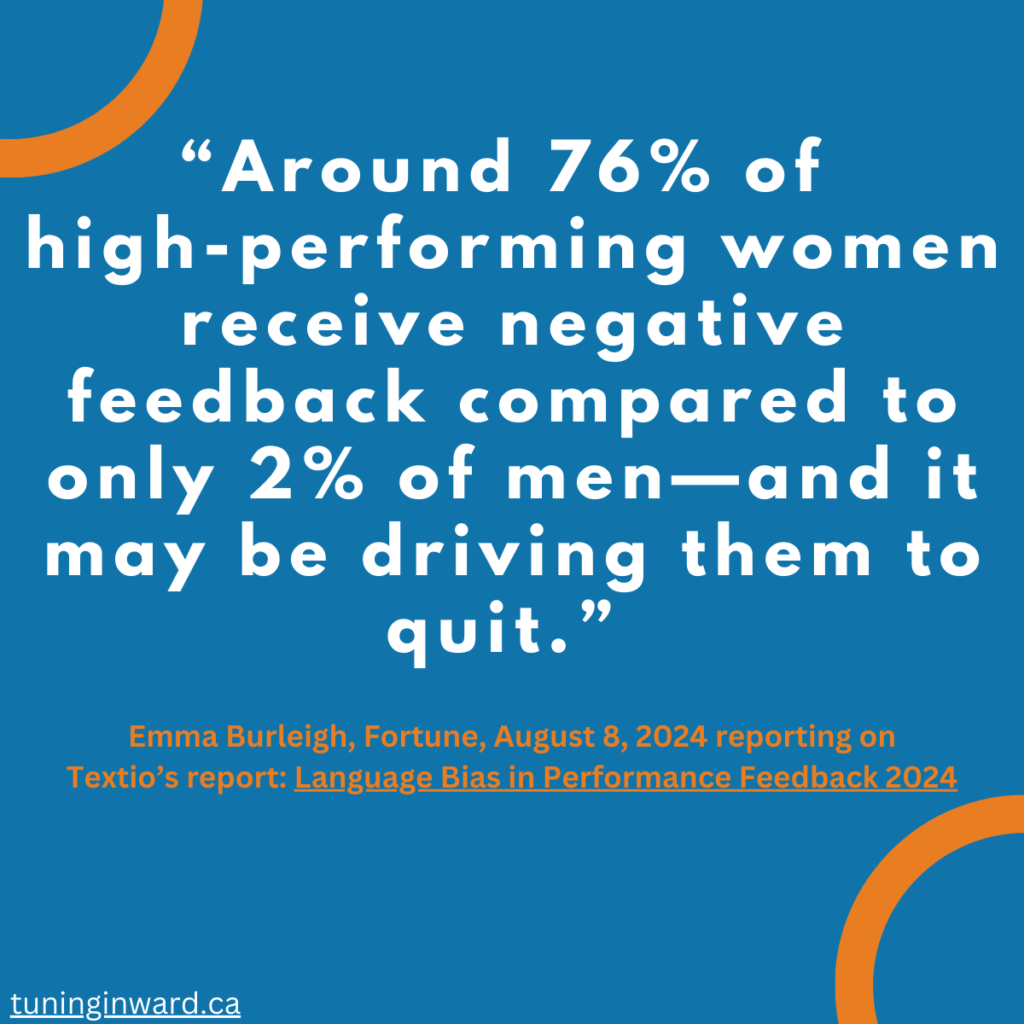Feedback is often hailed as the cornerstone of professional development. It’s what helps employees grow, refine their skills, and advance in their careers.
However, recent insights from a comprehensive report by Textio, which analyzed performance reviews for over 23,000 workers across 250 organizations, reveal that not all feedback is created equal—and the implications for employee retention are profound.
Differences in Feedback Across Genders
One of the most striking findings from Textio’s analysis is the gender disparity in the type of feedback men and women receive.

Kieran Snyder, cofounder and data analyst for Textio, tells Fortune this has largely to do with managers’ unconscious bias—women are judged more critically, and on a more personal level than men. “It’s a pattern that is not often checked,” she says.
Men are predominantly given developmental and constructive feedback that focuses on their work and professional achievements. This type of feedback is crucial because it provides clear, actionable insights into how they can improve and advance in their careers.
In contrast, women’s feedback often centers on their demeanor, personality, or disposition, rather than their work. For instance, instead of recognizing a woman’s successful completion of a significant project, Textio found that her performance review might describe her as “a joy to work with.”
While positive feedback is important, when it’s detached from the actual work done, it diminishes the value of the woman’s contributions and can stifle her career growth.
The Problem with Unactionable Feedback
Another concerning trend revealed by Textio’s analysis is the prevalence of unactionable feedback, particularly for women.
Unactionable feedback is vague, non-specific, and fails to provide clear guidance on how the individual can improve. This type of feedback is not only unhelpful but can also be demoralizing. It sends a message that their contributions are not fully valued, and can leave employees without a clear path forward, leading to frustration and disengagement.
High-performers, who are often ambitious and driven, crave clear, specific feedback that they can use to propel their careers forward. When employees receive actionable, constructive feedback that acknowledges their achievements and provides clear guidance on how to improve, they are often energized and motivated to stay. They see a path for growth within the organization and are more likely to remain loyal, contributing to the company’s long-term success.
When they don’t receive it, they are more likely to seek opportunities elsewhere—especially since they are often highly sought after by other organizations.
Effective Feedback is Critical for Retention
Low-quality feedback damages employee morale, especially for high-performers who thrive on growth and improvement. According to the analysis, around 40% of top performers who receive unactionable criticism consider leaving their companies. This is almost double the rate of those who receive actionable, constructive feedback.
High-performing employees drive innovation, inspire their teams, and consistently deliver results. They even positively impact the productivity of workers around them. Michael Housman and Dylan Minor of Northwestern University looked at the 25-foot radius around high performers at a large technology firm and found that these workers boosted performance in coworkers by 15 percent! This makes high performers even more critical to retain.
Empowering Leaders to Deliver Effective Feedback
As the data from Textio’s analysis clearly shows, the quality of feedback can have a significant impact on employee retention. By prioritizing clear, actionable, and equitable feedback, organizations can ensure that their best performers remain engaged and committed for the long term.
Leaders should focus on delivering feedback that is specific, actionable, and tied directly to the work being done. Recognition and rewarding of achievements should be based on performance, rather than personality traits. Additionally, organizations should regularly review their feedback processes to identify and address any biases that may exist.
Creating a culture of effective feedback is not just about improving individual performance—it’s about retaining top talent and fostering an environment where all employees can thrive.
The insights from Textio’s analysis provide a clear call to action for organizations: prioritize effective, actionable feedback to retain your top talent. In a competitive job market, where high-performers have numerous options, the quality of feedback they receive can make all the difference in whether they choose to stay or go.
Let’s connect if you’re interested in discussing how to give or seek out effective feedback!